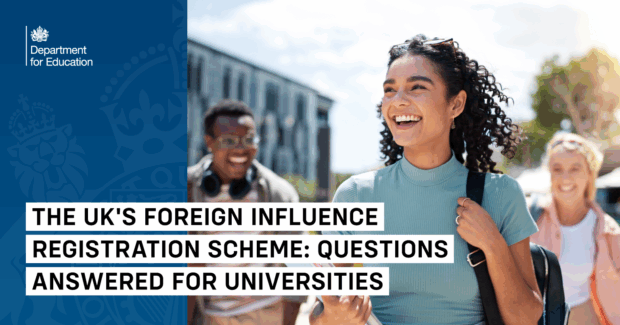
From 1 July 2025, the UK’s new Foreign Influence Registration Scheme (FIRS) will come into force. The scheme aims to increase transparency around foreign powers’ activity in the UK, to help protect the country’s safety and interests.
Under the scheme, two types of activity may need to be registered:
- Political influence – this includes where foreign powers seek to influence political decisions, elections or government policy.
- Enhanced Tier – this covers a wider range of activity, where it is carried out at the direction of certain specified foreign powers – currently Iran and Russia. You can find the list of specified countries here.
Here’s what universities, researchers and students need to know.
Who needs to register under the scheme?
Activity which doesn't involve foreign governments won't need to be registered, and the majority of academic work and research won't be affected. Where activities do come into scope, the scheme doesn't stop you from doing them. It is about transparency, and providing activities are registered where they need to be, they may go ahead.
As a researcher or student, you will only need to register if a foreign government is instructing you to influence political decisions in the UK, or if the arrangement involves a form of instruction from a specified foreign government - currently Russia and Iran. Simply being an international researcher, overseas student or working with a foreign university doesn't mean you need to register.
If you're a student receiving a scholarship from a foreign government, you don't need to register for activities that are just part of your studies
When would my research need to be registered?
You need to register your research only in specific cases. For example, if a foreign government tells you to suggest policy changes to the UK government, present findings to UK officials to influence policy, or give evidence to Parliament as part of their influence campaign.
Another specific case is if your research involves instructions, such as contractual obligations to share information, from a foreign power on the enhanced tier - currently Russia and Iran.
If you control what your research says and no foreign government is telling you what conclusions to reach or instructing you to use it to influence political decisions, you don't need to register. The scheme respects academic freedom and independent research.
How do the rules about funding work?
You may need to register funding if it comes from a foreign government and is intended to influence UK politics, or if it comes from a foreign power on the enhanced tier with instructions on how it should be used. For instance, if a foreign government funds a particular research project with conditions, registration might be necessary.
You don't need to register if the donation is unrestricted or for general purposes. Money from alumni who work for foreign governments usually doesn't require registration unless they're giving it officially on behalf of their government with conditions attached.
The amount of money doesn't matter - it's about who it's from and whether there are conditions that limit how you can use it.
What about international academics and students?
Visiting academics from certain countries only need to register if their government sends them to carry out political influence activities in the UK, or if it involves specified foreign governments. Simply being from a particular country or having connections to foreign institutions doesn't mean you need to register.
They would only need to register if they're told to do political work beyond their studies. The scheme protects normal educational activities.
If you're a student on a foreign government scholarship, you don't need to register the normal conditions about your studies. You would only need to register if a specified foreign power tells you to do something not related to your course.
Do student societies need to register?
Student societies only need to register if a foreign government directs or funds them to influence UK politics, such as through lobbying or organised protests aimed at changing government policy, or if any of their activities are directed by a specified foreign government.
If students run campaigns on their own without foreign direction or funding, they don't need to register. Independent student activities, even about international issues, are not affected by the scheme.
Will international collaborations be affected?
Working with universities in other countries usually doesn't require registration. Standard joint research, academic collaborations, and knowledge sharing can continue without registering. This applies even if the partner university is in a country listed as a specified foreign power, unless that university itself is specifically named a specified foreign power is directing the collaboration.
Where can I get more help?
The Foreign Influence Registration Scheme aims to bring transparency to foreign influence while respecting academic freedom. If you're not sure whether you need to register, it's best to get legal advice or contact the relevant government department directly, check the guidance on gov.uk, or seek legal advice.
Universities and research institutions should familiarise themselves with the requirements, but most academic activities will continue as normal without needing to register under FIRS.